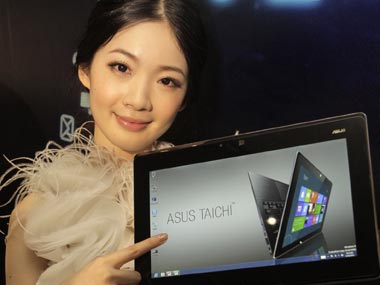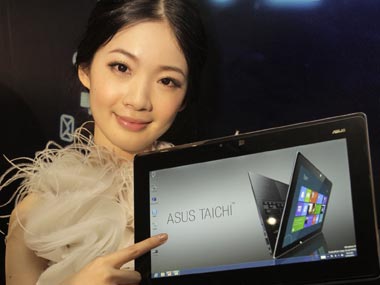The second biggest electronics show in the world, the Computex 2012 has begun in Taipei, Taiwan. So what has caught the eyeballs of tech enthusiasts all across. Asus’ dual screen Windows 8 PCs, an odd hybrid between an ultrabook and a tablet. Here’s a look at two of products launched by the firm.
Asus Taichi: This is dual screen for notebook and a multi-touch tablet all in one. It’s available in two screen sizes, 11.6-inch and 13.3-inch, both of which have double-sided LED-backlit display.
The Asus TAICHI is just like any notebook computer, and comes complete with a full-size QWERTY backlit keyboard and track pad. But it comes with a touch screen on the outside of the lid. Users can close the lid and convert their notebook into a multi-touch tablet computer with stylus support.
According to CNET : Asus says that the two screens work independently and that both can be used for different applications at the same time.
[caption id=“attachment_332616” align=“alignleft” width=“380” caption=“The Asus Taichi. Reuters”]
 [/caption]
[/caption]
The Taichi runs on the latest Intel Core-i processors, along with SSD storage and Asus’ SonicMaster audio technology according to CNET.
The Transformer Book: Thisis a much bigger convertible notebook that allows users to switch between a notebook and a tablet by simply detaching the screen.It has an Intel Core i7 processor, SSD and HDD storage, 4GB DDR3 dual channel RAM, and USB 3.0.As far as cameras capabilities go, the notebook/tablet has a dual cameras, with a HD front-facing camera and a 5MP rear-facing camera. Its available in 11.6-inch, 13-inch or 14-inch screens.
According to CNET, the device also has discrete graphics but Asus has not confirmed whether it will use AMD or Nvidia graphics. The launch dates and prices of the products have not yet been revealed by the company.
So what are the early reactions to Asus’ attempts to marry a tablet and a PC, in the era where touch-screen tablets are killing PC sales. Not everybody is impressed?
PCWorld’s , Tony Bradley is not too impressed. He writes,
I’m not sure these devices provide any practical benefits for the ‘post-PC era’. The different devices seem innovative in their own unique ways, but seem like they try to straddle the line between PC and post-PC and deliver an “all of the above” solution.
The Transformer book does look bulky and it seems like Asus is trying really hard. Compared to sleek thin iPad or a Macbook Air, the hybrid PC fares poorly in terms of design.
Note that Asus like Acer is also using Windows 8 for its tablets, hybrid ultrbooks. Will this Windows 8 push help both the tech companies and Microsoft put an end to the Apple juggernaut? That remains to be seen but skeptics won’t be convinced easily.
)